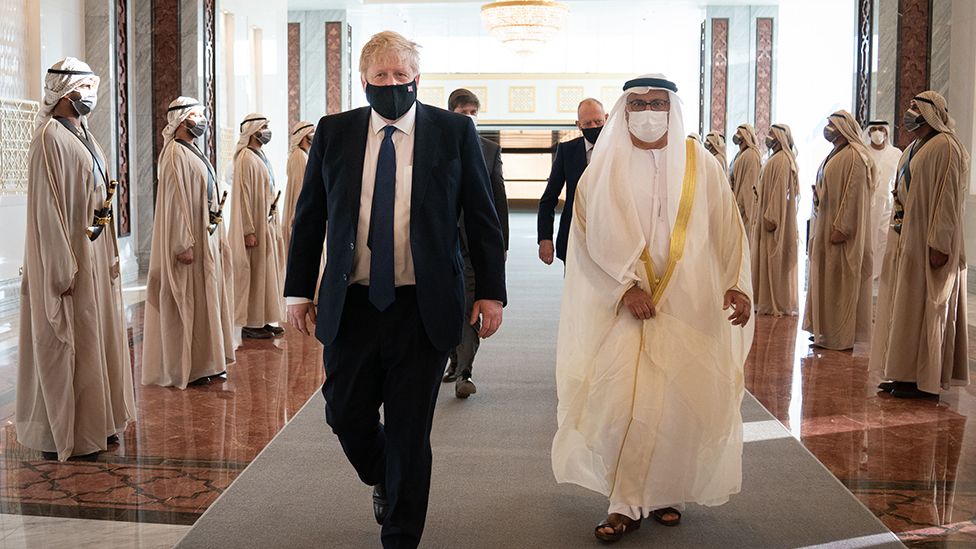Why is turning to Saudi Arabia for oil so controversial?
- Published

UK Prime Minister Boris Johnson has defended a trip to Saudi Arabia, saying "the widest coalition" is needed to end reliance on Russian oil and gas.
But maintaining close ties with the Gulf kingdom is controversial among critics of its human rights record.
Why is Saudi Arabia so important for oil?
The US, UK and EU have announced that they will buy less Russian oil and gas, because of its invasion of Ukraine. However, prices have rocketed.
Saudi Arabia is the largest producer in the oil cartel Opec and has the spare capacity to help lower prices by increasing supplies.
It means Western countries need its goodwill and to keep on friendly terms with its ruling family.
Use of the death penalty
Saudi Arabia is among the countries carrying out the most executions.
In March it executed 81 men in a single day - more than during the whole of last year. They were convicted of "multiple heinous crimes", including terrorism, kidnapping and rape, state news agency SPA said.
Rights organisations say many do not receive fair trials in Saudi Arabia, an allegation the government rejects.
Murder of a dissident journalist
Saudi Arabia's international standing was severely damaged by the 2018 killing of Jamal Khashoggi, a US-based Saudi journalist who was a prominent critic of the government.
UN-appointed human rights expert Agnes Callamard said Saudi agents had "used state means to execute Mr Khashoggi" at its Istanbul consulate.
Saudi Arabia's de facto ruler, Crown Prince Mohammed bin Salman, and other senior officials were incriminated. Although the crown prince denied any involvement, his reputation was badly tarnished.
Mohammed bin Salman is asked: "Did you order the murder of Jamal Khashoggi?"
After the kingdom's Public Investment Fund was allowed to buy an 80% stake in Newcastle United, Mr Khashoggi's fiancée, Hatice Cengiz, called the takeover "heart-breaking".
Jailing of women's rights activists
In 2018, Saudi authorities arrested 13 women's rights activists who had led a campaign to lift a ban on women driving.
At least four of the women were allegedly tortured and sexually harassed by interrogators.
In 2020, a terrorism tribunal found the most prominent activist, Loujain al-Hathloul, guilty of crimes against the state.
After the original sentence was upheld at an appeal, Amnesty International's Lynn Maalouf said: "By failing to quash Loujain al-Hathloul's conviction, the Saudi Arabian authorities have clearly demonstrated that they consider peaceful activism a crime."
Crackdown on intellectuals, clerics and reformists
Women's rights activists have not been the only people detained as part of a crackdown against critics in Saudi Arabia, where political parties, trade unions and independent human rights groups are banned.
Dozens of human rights defenders, intellectuals, academics, clerics and reformists have also been arrested since 2017, merely for exercising their right to freedom of expression, according to international human rights organisations.
Many have faced what Amnesty International has said were grossly unfair trials on vague terrorism and cybercrime charges, and received harsh sentences, including the death penalty.
Days before the Newcastle United takeover, a court upheld a 20-year prison sentence handed to Saudi-American aid worker Abdul Rahman al-Sadhan for writing satirical tweets criticising the authorities.
The devastating war in Yemen
Saudi Arabia has been heavily criticised for a military campaign in neighbouring Yemen that has caused a humanitarian catastrophe.
A Saudi-led coalition intervened in 2015 after Yemeni rebels seized control of much of the west of the country and forced the president to flee abroad.
Tens of thousands are also estimated to have died from indirect causes, such as lack of food, health services and infrastructure. A partial blockade by the coalition has hampered efforts to help the 20 million people in need of humanitarian aid.
UN experts say both sides in the conflict may have committed war crimes, though the coalition has insisted it is abiding by the rules of war.
Punishment of same-sex relations
Although Saudi Arabia has no laws regarding sexual orientation or gender identity, sexual relations outside marriage, including homosexual sex, are strictly prohibited.
Under the country's interpretation of Islamic law, the death penalty is a possible punishment for same-sex sexual conduct.
It is also illegal for men to "behave like women" or to wear women's clothes, and vice versa.
An anti-cybercrime law criminalises online activity that goes against public order and religious morals.
In July 2020, a court sentenced a Yemeni blogger to 10 months in prison and then deportation for posting a video calling for equal rights, including for gay people.